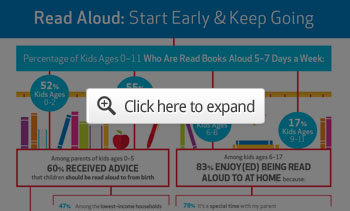A recent study presented at a meeting of the Pediatric Academic Societies revealed what happens when you read to a child.
Using brain scanners, the researchers found that reading to children from an early age activated brain areas including the occipital lobes, linked to visual imagery and the parietal lobes, linked to understanding the meaning of language.4,5 Dr. John S. Hutton of Cincinnati Children's Hospital Medical Center in Ohio told Reuters:6
“In one of the most intriguing aspects, some of the greatest activation was in the visual part, the occipital lobe… A lot of it’s probably the task, imagining in their brain what’s going on in the story.
These kids have more experience with seeing what they’re hearing… ‘Parents should definitely read often and read widely,’ with back-and-forth conversation with kids, going beyond what’s on the page.”
While the benefits of reading to children from an early age are well-established, this is the first study to use brain scans to show just why that might be.
Considering that reading to your kids is simple, enjoyable, and free if you get books from your local public library, this is one strategy that virtually everyone can use to give their kids an intellectual head start and a solid cognitive foundation upon which to grow and expand. As reported by the organization Reach Out & Read:7
“Once children start school, difficulty with reading contributes to school failure, which can increase the risk of absenteeism, leaving school, juvenile delinquency, substance abuse, and teenage pregnancy -- all of which can perpetuate the cycles of poverty and dependency.”
Additional benefits of reading aloud to children include:8
- Reading aloud is the single most important activity leading to language development
- Builds motivation, curiosity, and memory
- Helps children cope during times of stress or tragedy
- Exposes children to story and print knowledge as well as rare words and ideas not often found in day-to-day conversation or screen time
- Helps children practice listening
Earlier this year, children’s book publisher Scholastic released a survey showing only 31 percent of 6- to 17-year-olds surveyed had read for fun daily. This is down from 37 percent in 2010.9 If you’d like your child to be a frequent reader as an older child, adolescent, and adult, the report found you should continuing reading aloud, even after your child learns to read himself.
Being read to aloud early and often predicted frequent reading among children ages 6-11. Spending less time online using a computer was also important. Among older children ages 12-17, frequent readers tended to:
- Read a book for choice independently in school
- Engage in e-reading experiences
- Have a large home library
- Know their reading level
- Have parents involved in their reading habits
Being a frequent reader yourself is also a predictor that your child will enjoy reading. One way to share this with your child is to choose a book and read aloud together. More than 80 percent of children surveyed said they loved or “liked a lot” being read aloud to at home, primarily because it was a special time with parents. As reported by the New York Times:10
“‘A lot of parents assume that once kids begin to read independently, that now that is the best thing for them to do,’ said Maggie McGuire, the vice president for a website for parents operated by Scholastic.
But reading aloud through elementary school seemed to be connected to a love of reading generally. According to the report, 41 percent of frequent readers ages 6 to 10 were read aloud to at home, while only 13 percent of infrequent readers were being read to.”

No comments:
Post a Comment